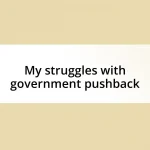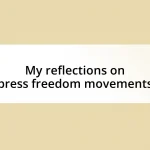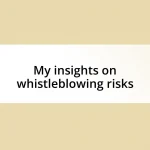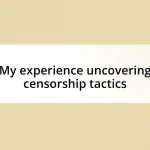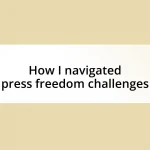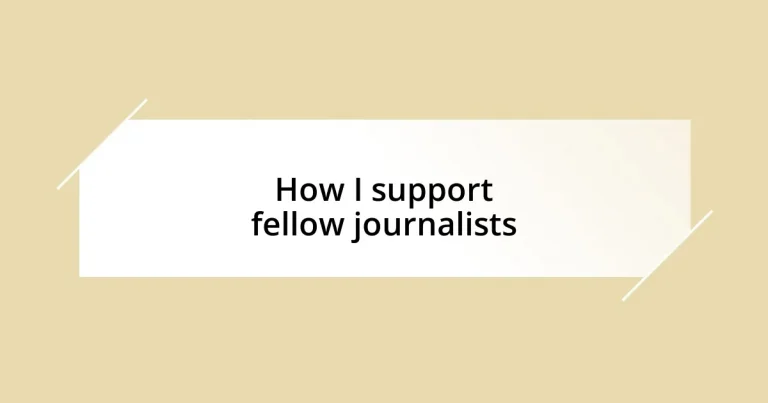Key takeaways:
- The journalist community thrives on shared experiences, fostering empathy and understanding among colleagues.
- Identifying support needs includes emotional support, professional development, and practical mentorship.
- Building relationships through regular check-ins, sharing opportunities, and collaborative projects enhances professional bonds and enriches storytelling.
- Advocating for ethical journalism encourages open dialogues about responsibilities and integrity in reporting.
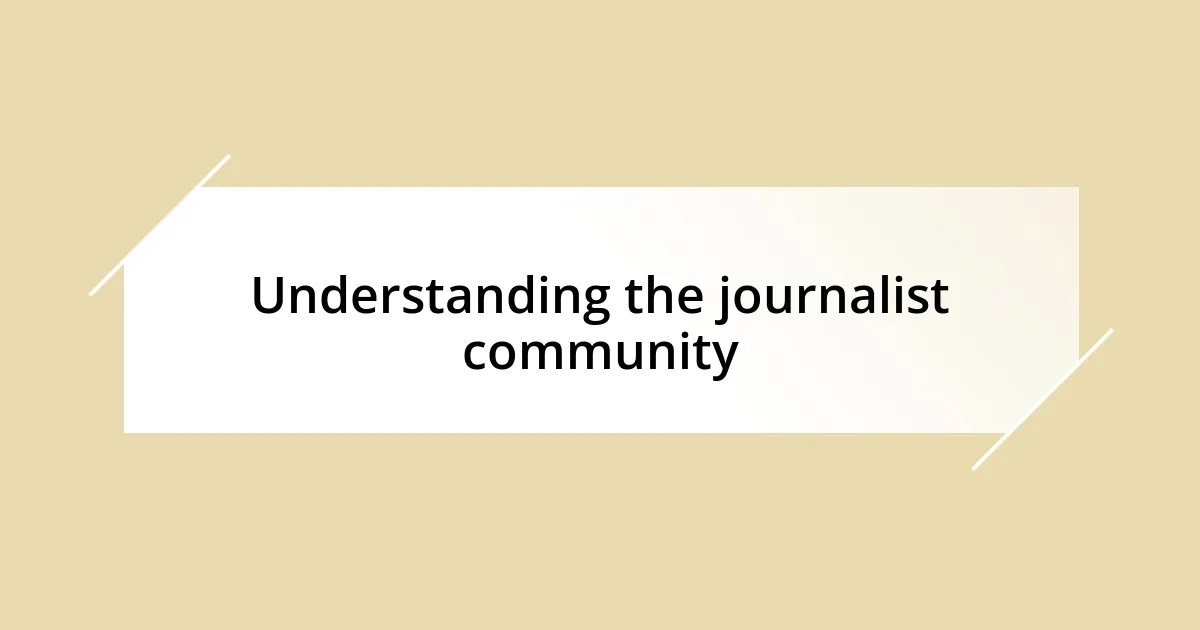
Understanding the journalist community
Understanding the journalist community begins with recognizing the shared experiences that bind us together. I recall my first reporting assignment; the adrenaline rush of meeting deadlines, coupled with the pressure of accuracy, truly highlighted the bonds we form through stress and triumph. Isn’t it fascinating how no matter where you are in the world, a fellow journalist can instantly relate to those high-stakes moments?
Moreover, there’s an unspoken camaraderie among us, often rooted in empathy. When a colleague faced a difficult story, I felt compelled to offer my support, recalling my own struggles during tough assignments. We have all been there—don’t you find that those connections foster a unique kind of understanding that empowers us?
It’s important to realize that the journalist community is vibrant and diverse, encompassing various backgrounds and specializations. Often, I’ve found that sharing insights can be just as enriching as formal training. Have you ever learned something invaluable from a casual chat with a fellow journalist over coffee? Those moments of sharing not only enhance our skills but also remind us that we’re all navigating similar paths, united by passion and purpose.
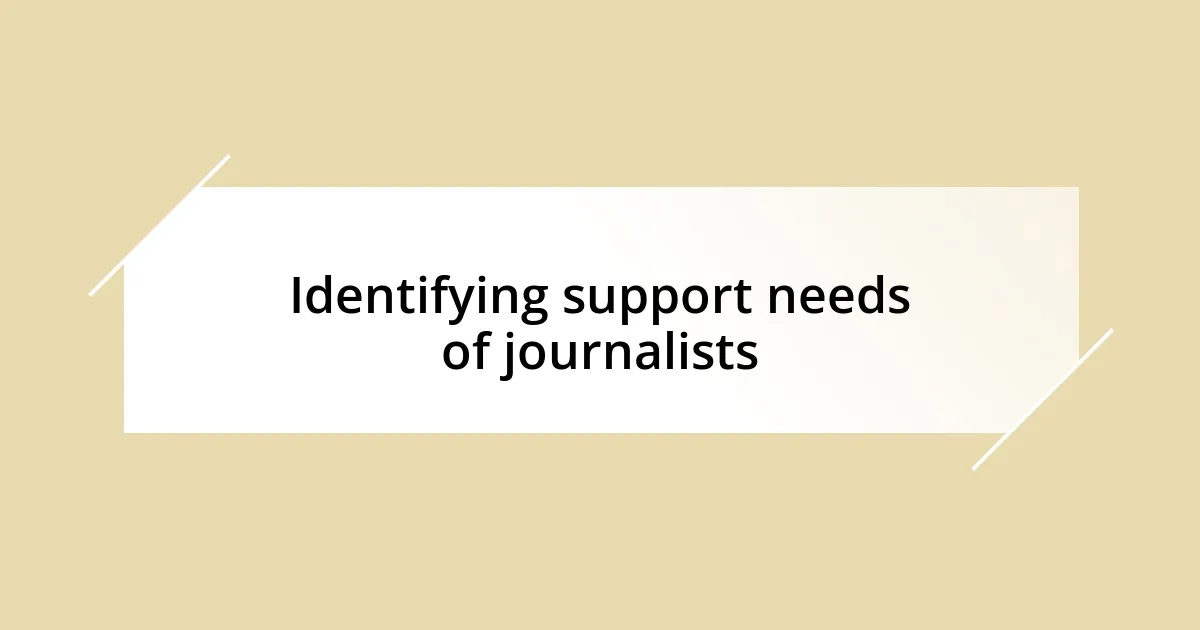
Identifying support needs of journalists
Identifying the support needs of journalists is often rooted in understanding their individual and collective challenges. I remember once interviewing a colleague who expressed feelings of isolation after a hard-hitting story. Listening to her made me realize that sometimes, simply providing a space for open conversation can help tremendously. Have you ever felt that way? It’s crucial to recognize these emotional and psychological needs.
Furthermore, I see the importance of access to professional development. Just last month, I participated in a workshop that focused on digital storytelling. The connections I made with fellow journalists during this session were invaluable, as we shared ideas and learned from each other. This highlights that enriching our skill sets and engaging in collaborative opportunities can significantly enhance journalistic efficacy and confidence.
Lastly, practical support cannot be overlooked—such as mentorship, resources, or emotional check-ins. I often check in with junior reporters, offering guidance based on my own experiences, especially when deadlines are looming. It’s rewarding to see how a simple gesture can inspire someone to keep pushing forward in their career. These personalized approaches to support can make a world of difference in creating a healthy journalistic environment.
| Support Need | Example |
|---|---|
| Emotional Support | Listening to a colleague’s challenges during a difficult story |
| Professional Development | Participating in workshops and sharing insights |
| Practical Support | Offering mentorship and resources to junior journalists |
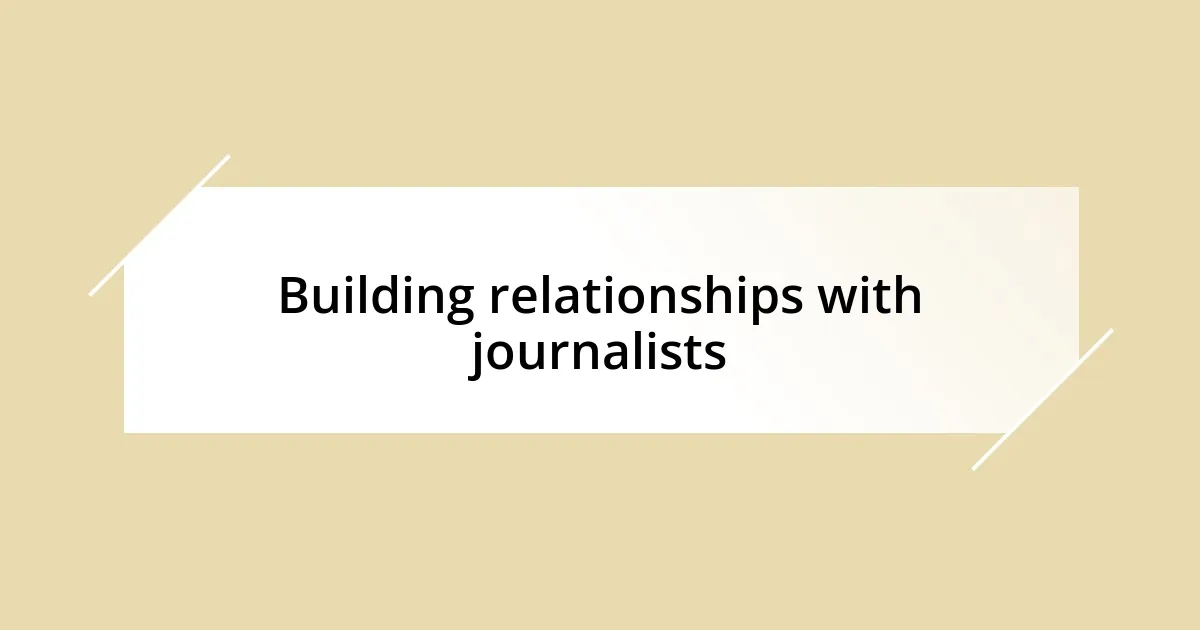
Building relationships with journalists
Building lasting relationships with journalists is about connection and mutual respect. I remember attending a small gathering where seasoned reporters shared stories over drinks. Listening to their war stories, I felt a sense of belonging, realizing that I had finally found my tribe. Those informal settings have always been the perfect backdrop for forging bonds that can lead to collaboration and future support.
As I continue to build these relationships, I focus on several key practices that have proven effective in nurturing connections:
- Regular Check-Ins: A quick message or call can show you care. I often reach out to colleagues just to see how they’re doing, and it always opens the door for deeper conversations.
- Sharing Opportunities: Whether it’s a job listing or an upcoming conference, I make it a point to pass along information that could benefit others.
- Celebrating Milestones: I make it a habit to acknowledge a colleague’s milestones, such as a new position or personal achievement, whether through a simple note or a public shout-out on social media. This fosters a sense of community.
- Creating Collaborative Projects: I’ve often initiated joint stories with fellow journalists. Sharing ideas and working together not only strengthens our ties but also enriches the final piece.
- Listening Actively: When someone opens up about their struggles, I strive to create a space where they feel heard. It’s amazing how a willingness to listen can deepen mutual respect and partnership.
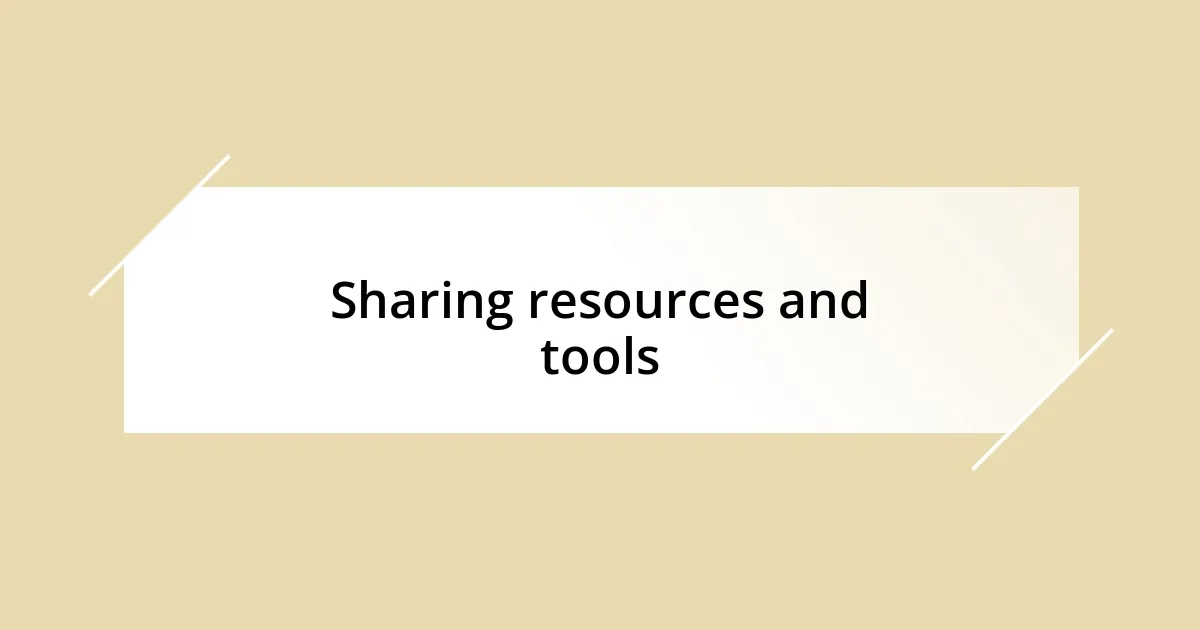
Sharing resources and tools
When it comes to sharing resources and tools, I often think about the underrated value of a well-curated list of contacts and platforms. For instance, when I needed reliable sources for a breaking news story, I shared my collection of expert contacts with a fellow journalist struggling to find leads. Isn’t it satisfying to see your colleagues succeed with the help of resources you’ve curated? Such simple acts can create a collaborative atmosphere that fosters growth for everyone involved.
I also enjoy sharing online tools that can simplify the reporting process. Recently, I introduced a friend to a content management system that I now swear by. Watching her navigate it with newfound ease felt like handing over a treasure map—suddenly, the treasure of efficient workflow was within her reach. It’s moments like these that reaffirm my belief in sharing knowledge. When we equip each other with the right tools, we reduce stress and elevate the quality of our work.
Moreover, I firmly believe in the power of collective learning experiences. A while back, I organized a resource-sharing session where journalists brought in their favorite apps, websites, or techniques. The exchange was electrifying! It not only educated us all but reinforced the idea that we can all benefit from one another’s experiences. Have you ever felt the energy in a room when everyone is excited to share? That synergy can truly enhance our craft and build a community of supportive peers.
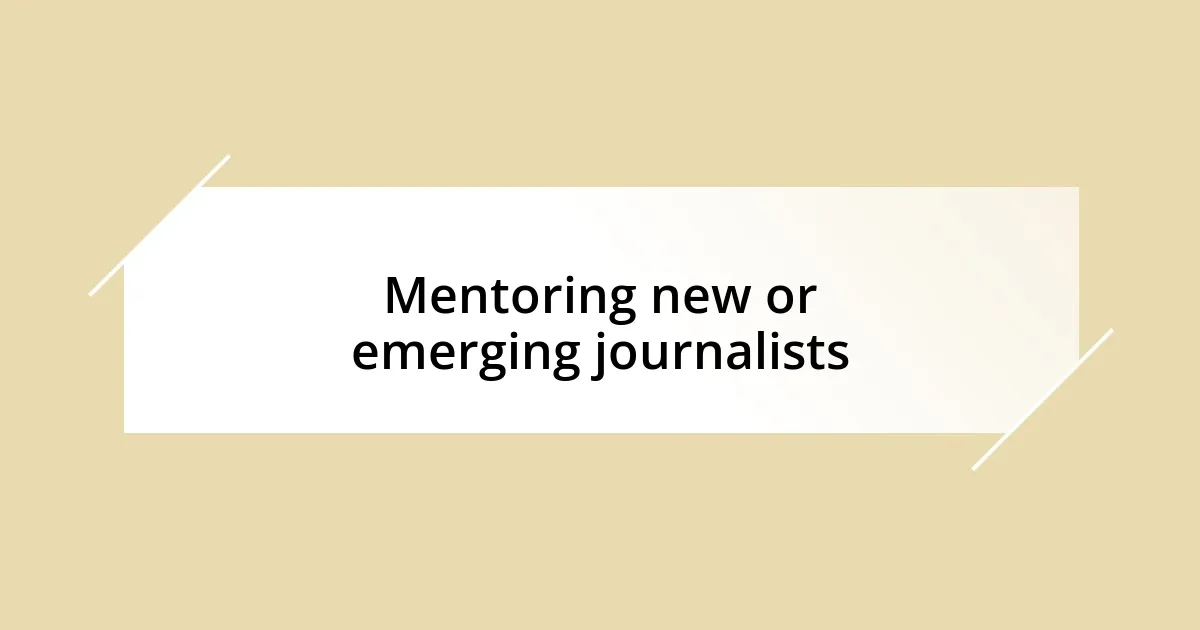
Mentoring new or emerging journalists
Mentoring new or emerging journalists has always been a passion of mine. I recall a time when I took a young reporter under my wing during a particularly challenging assignment. It was so rewarding to watch her transform from anxious and unsure to confident and proactive. This kind of growth fuels my motivation to guide others; isn’t it amazing to witness how a little support can spark someone’s potential?
One method that has worked wonders for me is holding informal ‘coffee chats’ where we discuss the nitty-gritty of journalism beyond the classroom. During one such chat, I shared my experiences covering sensitive stories and the ethical dilemmas I faced. Seeing her eyes widen as I recounted those moments, I realized how much value a personal story can carry. When emerging journalists can relate to real-life scenarios, it helps them navigate their own challenges with greater insight.
I find it essential to create a safe space for questions, too. On occasions, I’ve hosted informal workshops focused on investigative reporting techniques. I remember one participant hesitating to ask if he could claim the work of others while digging for the truth. Encouraging him to voice his concerns fostered a rich discussion about integrity and original work in journalism. These dialogues not only empower budding journalists but also remind me of the core values that we must uphold.
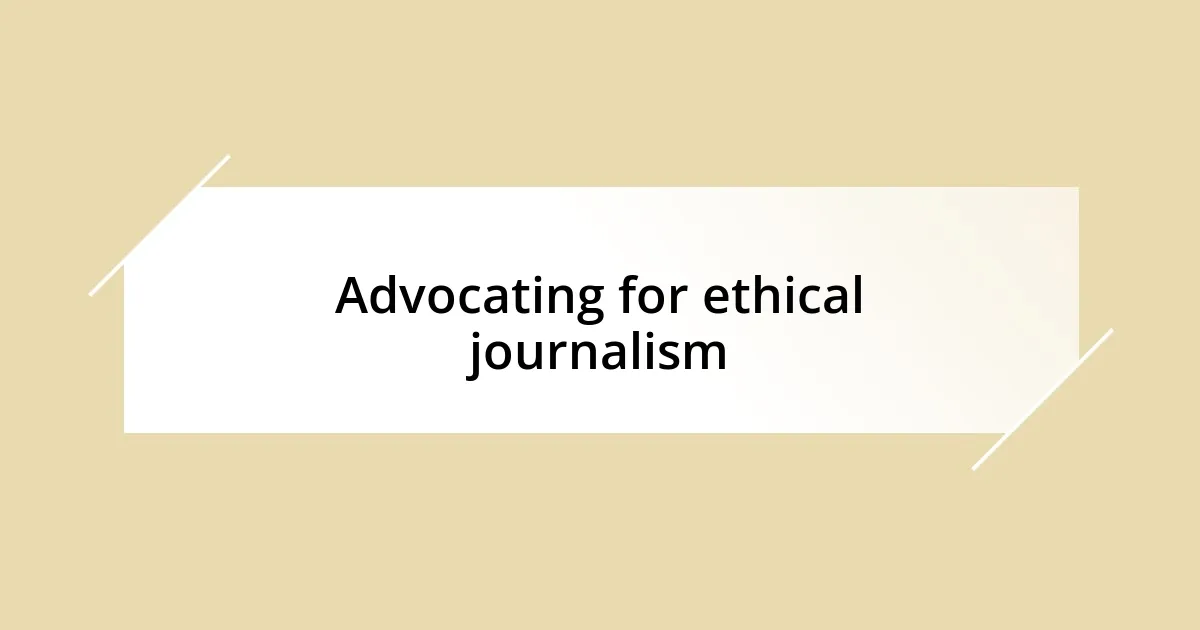
Advocating for ethical journalism
Advocating for ethical journalism is something I hold dear. I vividly remember a heated debate during a journalism conference that centered around the fine line between investigative reporting and invasion of privacy. As I listened to passionate arguments, I couldn’t help but feel a sense of responsibility—journalists must wield our tools with care. Isn’t it vital to remember that our role is not just to inform, but to do so with respect for those we cover?
One moment that stands out to me was when I took a stand against sensationalism in a room full of esteemed editors. I shared a story about a reporting incident where intense headlines overshadowed the humanity of the subjects involved. The room fell silent, and I could sense a shift in perspectives. That experience reminded me that advocating for ethical journalism isn’t just about speaking up—it’s about challenging our peers to see the impact of their choices on real lives.
It’s essential to foster conversations about ethics not just in formal settings but informally, too. For instance, at a local café, I often engage fellow journalists in discussions about our responsibilities, asking questions like, “How far is too far when seeking the truth?” These dialogues, free from judgment and ripe with empathy, allow us to reflect on our practices and reinforce our commitment to ethical reporting. After all, isn’t it through these conversations that we can shape a more conscientious journalism landscape together?
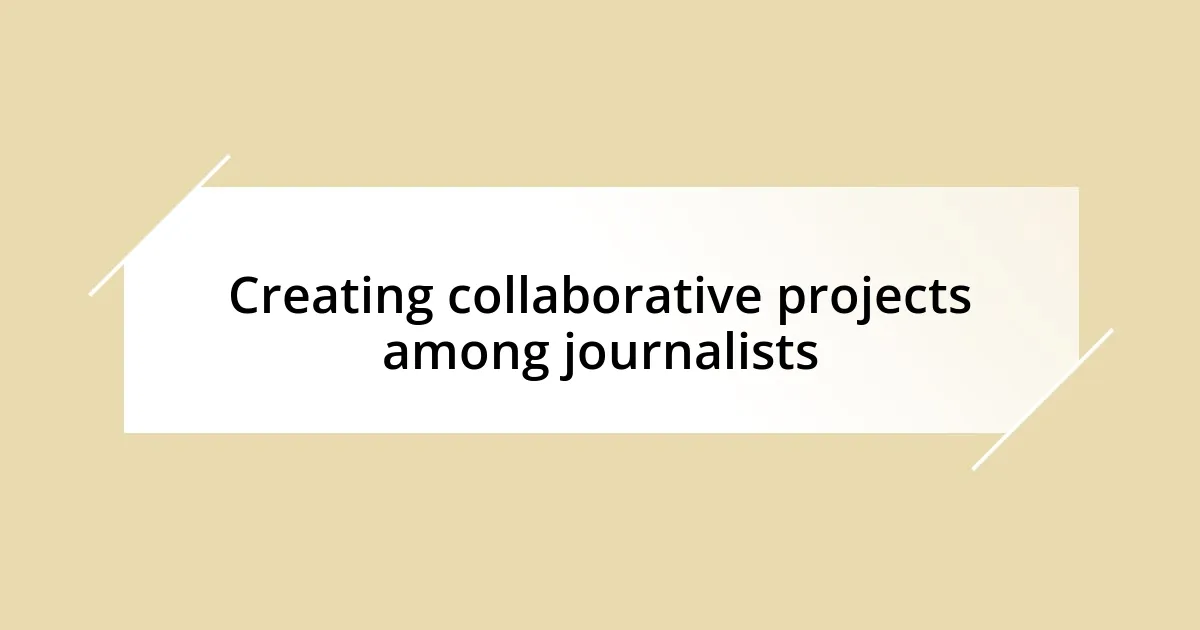
Creating collaborative projects among journalists
Creating collaborative projects among journalists can truly elevate the power of storytelling. I remember proposing a community-driven feature series that involved multiple journalists contributing to a shared narrative. The energy in the room was electric as each journalist brought their unique perspective and expertise; it was a moment that reminded me how diverse voices can create a richer tapestry of understanding on any given topic. Doesn’t it inspire you to think about what we can achieve together?
In one memorable instance, we teamed up with local artists and community members for an arts journalism project. The collaboration not only allowed us to amplify underrepresented voices but also taught us invaluable lessons about the power of cross-disciplinary work. I still think back to the powerful conversations that sparked from these partnerships. How often do we get the chance to step outside our journalistic bubbles and truly listen to the stories waiting to be told?
I genuinely believe that the strength of journalism lies in our connections. During a recent project, I reached out to fellow journalists across different regions to tackle the same theme from various angles. As we shared resources and insights, it felt like we were weaving a collective narrative together. It reinforced my belief that collaborative projects not only enhance the work but also strengthen our camaraderie as journalists. Isn’t it amazing how working together can lead not only to better journalism but also to friendships and mutual respect?




